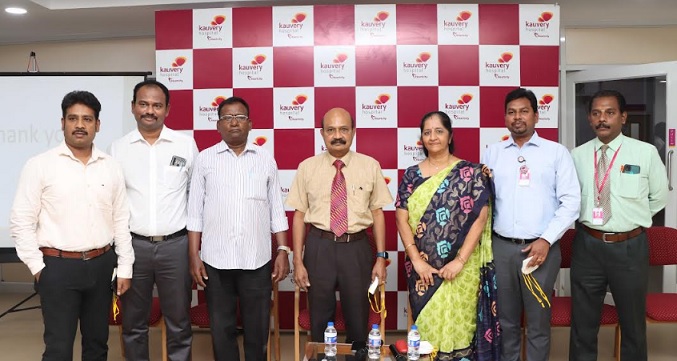Kauvery Hospital Successfully Performs Leadless Pacemaker Implantation on a 58-year-old man, First in Trichy
Summary
Trichy, Tamil Nadu, India Kauvery Hospital Heart city – Trichy, a unit of Kauvery Group of Hospitals, a leading multispecialty healthcare chain in Tamil Nadu, today announced the successful implantation of a leadless pacemaker on a patient with recurrent pacemaker […]

Trichy, Tamil Nadu, India
Kauvery Hospital Heart city – Trichy, a unit of Kauvery Group of Hospitals, a leading multispecialty healthcare chain in Tamil Nadu, today announced the successful implantation of a leadless pacemaker on a patient with recurrent pacemaker allergy.
 |
Dr. T. Joseph, Lead Electrophysiology & Interventional cardiologist successfully performs Leadless Pacemaker Implantation on a 58-year-old man at Kauvery Hospital Heart city – Trichy
The patient, aged 58 years, had approached the hospital with complaints of multiple episodes of pacemaker erosion ever since he received an implant of a conventional (lead) artificial pacemaker in 2017 from another hospital. The patient’s case history was thoroughly studied by the medical experts lead by Dr. Joseph who then decided to go ahead with the implantation of a Leadless Pacemaker.
Speaking on the case, Dr. T. Joseph, Interventional Cardiologist and Lead Electrophysiologist, Kauvery Heartcity, Trichy, said, “The patient had previously been implanted with a conventional lead pacemaker 4-5 times on both left and right side of the chest at a hospital elsewhere, which kept getting eroded. My team and I explained to the patient the advantages of a leadless pacemaker – AV MICRA (Dual chamber), which is an advanced device and non-allergic to patients. The patient agreed to go ahead with the implantation.”
Pacemaker allergy is a rare phenomenon that can present with a spectrum of mild local inflammation to severe systemic inflammation and hence remain a serious concern to the affected heart patients. This results in multiple device replacements, high cost to patient and increased morbidity burden.
“Leadless pacemakers are introduced in Cardiac Electrophysiology with the goal to avoid lead and pocket-associated complications from conventional artificial pacemakers (CPM). The leadless pacemaker is 90% smaller than a conventional/transvenous pacemaker. The device weighs less than 9 gms and has a volume of 0.8cc. It is a miniature device sent directly to the heart through a catheter. It is a self-contained generator, where the electrode system (battery) is directly implanted into the right ventricle. The device is implanted via a femoral vein transcatheter approach; it requires no chest incision or subcutaneous generator pocket whereas, in a conventional pacemaker, the electrode system is placed in the pectoral area (chest) with wires connected to the heart. This technology turned out to be the best option for this particular patient,” added Dr. T. Joseph.
Commenting on the success of the case, Dr. T. Senthil Kumar, Executive Director and Chief Cardio Thoracic-Vascular Surgeon, Kauvery HeartCity, Trichy said, “This technology is relatively new in the market, having been introduced in 2018 and has been offered to only 8-9 cases in our country. This is the first time in Trichy, and 2nd in Tamilnadu, that this type of advanced Leadless chip Pacemaker AV MICRA, with Dual chamber, has been used on patients.
Dr. Joseph has used the same technology for a 7-year old child in 2020, which was the first in the country, and globally the 3rd paediatric Implant. This placed India on a world pedestal, at a Pacing Series Workshop in 2020 held in Hungary.
Allergic reactions to pacemaker device components are uncommon. However, when they occur, they usually mimic pacemaker infection, which results in multiple pacemaker replacements. This is what happened to the adult patient featured here. He approached us and we were able to provide him the better procedure that shall ensure that his woes won’t return, and that he shall not be troubled with further complications in the future. Without the right treatment from the right specialists, these infections can be life-threatening – making it crucial to seek and find the highest level of care as soon as possible.”
The patient was discharged post-observation the very next day after the implantation. He will however be visiting the hospital to get the device monitored over the coming months.
(Disclaimer: The above press release comes to you under an arrangement with NewsVoir India and this publication takes no editorial responsibility for the same)
